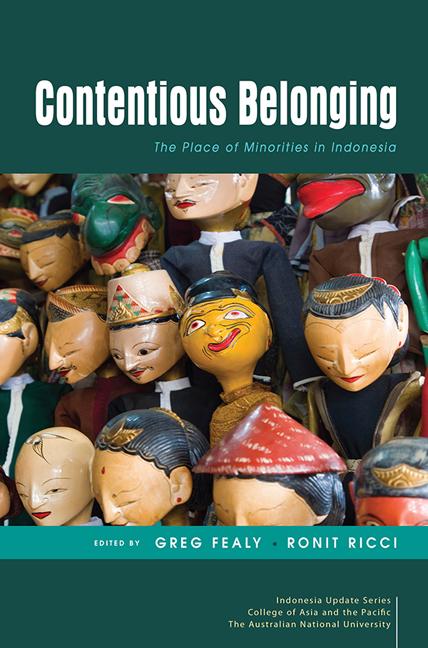Book contents
- Frontmatter
- Contents
- Tables and figures
- Contributors
- Acknowledgments
- Glossary
- Map
- 1 Diversity and its Discontents: an Overview of Minority–Majority Relations in Indonesia
- PART 1 HISTORY AND LAW
- PART 2 DISABILITY
- PART 3 SEXUALITY
- PART 4 RELIGION AND ETHNICITY
- 9 The Mobilisation of Intolerance and its Trajectories: Indonesian Muslims Views of Religious Minorities and Ethnic Chinese
- 10 Disputes Over Places of Worship in Indonesia: Evaluating the Role of the Interreligious Harmony Forum
- 11 Anti-Chinese Sentiment and the ‘Return’ of the Pribumi Discourse
- 12 Minority and Advantage: the Story of Sindhis in Indonesia
- 13 ‘Normalising’ the Orang Rimba: Between Mainstreaming, Marginalising and Respecting Indigenous Culture
- PART 5 REFLECTIONS
- Index
- Indonesia Update Series
11 - Anti-Chinese Sentiment and the ‘Return’ of the Pribumi Discourse
from PART 4 - RELIGION AND ETHNICITY
Published online by Cambridge University Press: 06 September 2019
- Frontmatter
- Contents
- Tables and figures
- Contributors
- Acknowledgments
- Glossary
- Map
- 1 Diversity and its Discontents: an Overview of Minority–Majority Relations in Indonesia
- PART 1 HISTORY AND LAW
- PART 2 DISABILITY
- PART 3 SEXUALITY
- PART 4 RELIGION AND ETHNICITY
- 9 The Mobilisation of Intolerance and its Trajectories: Indonesian Muslims Views of Religious Minorities and Ethnic Chinese
- 10 Disputes Over Places of Worship in Indonesia: Evaluating the Role of the Interreligious Harmony Forum
- 11 Anti-Chinese Sentiment and the ‘Return’ of the Pribumi Discourse
- 12 Minority and Advantage: the Story of Sindhis in Indonesia
- 13 ‘Normalising’ the Orang Rimba: Between Mainstreaming, Marginalising and Respecting Indigenous Culture
- PART 5 REFLECTIONS
- Index
- Indonesia Update Series
Summary
Chinese Indonesians have received considerable public attention in recent times, mostly because of the blasphemy scandal involving the ethnic Chinese and Christian former governor of Jakarta, Basuki Tjahaja Purnama (known as Ahok). A popular governor with consistently high approval ratings, Ahok was widely tipped, before September 2016, to win the 2017 Jakarta gubernatorial election. Then, in late September, he made a campaign speech in Jakarta's Thousand Islands district referring to verse 51 of the Al-Ma'idah chapter of the Qur'an, which is generally interpreted as saying that Muslims should not have non-Muslim leaders. Ahok urged Muslim voters to make up their own minds about the interpretation of the verse and not simply to follow those who claimed that it was sinful to elect a non-Muslim leader like himself. Within weeks, a series of mass protests in central Jakarta organised by hardline Islamist groups such as the Islamic Defenders Front (Front Pembela Islam, FPI) were attracting hundreds of thousands of Muslim protesters from all over Indonesia.
What started as a religious issue soon also became a race and class issue. Very quickly, angry and hate-filled racist messages began to appear at the anti-Ahok demonstrations, directed not only towards the governor but also towards the ethnic Chinese as a group. The protesters cited Ahok's notoriously abrasive character as evidence of the arrogance and sense of superiority of Chinese Indonesians (Walden 2017).
Following the first mass demonstration on 4 November 2016, groups of protesters went to the exclusive north Jakarta residential estate where Ahok and his family lived. Most of the people living at the estate were affluent ethnic Chinese, and for them, the protesters’ threats to torch their houses echoed the horrors of earlier riots in May 1998 targeting the Chinese. Although the protesters eventually left without creating much havoc, anti-Chinese rhetoric intensified in the months that followed, particularly on social media. For instance, rumours abounded that Ahok's political rise had been financed and engineered by Chinese Indonesian business tycoons who hoped to exert political influence on the governor and other politicians, including Ahok's close ally, President Joko Widodo (Jokowi). It was also claimed that Ahok's controversial Jakarta Bay land reclamation project was intended to house millions of new migrants from China, rather than providing low-cost housing for Indonesians.
- Type
- Chapter
- Information
- Contentious BelongingThe Place of Minorities in Indonesia, pp. 194 - 213Publisher: ISEAS–Yusof Ishak InstitutePrint publication year: 2019



